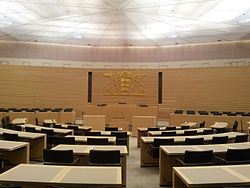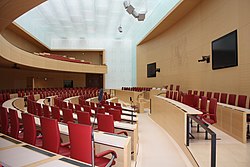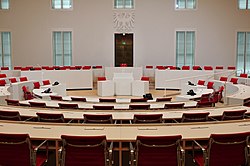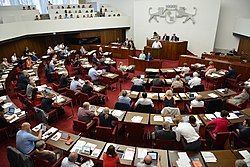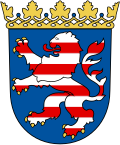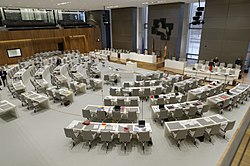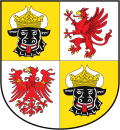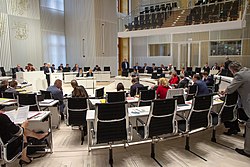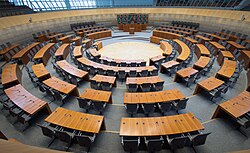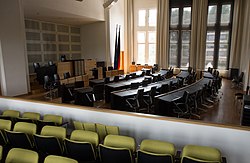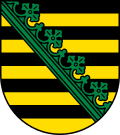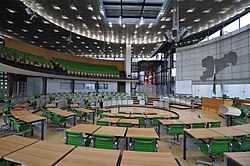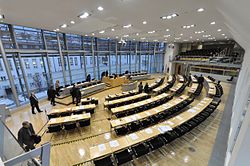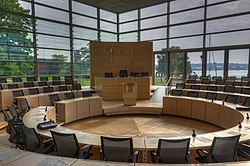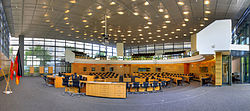| State | Name | Election system | Threshold conditions | Seats | Term | Premature dissolution procedures |
|---|
| Baden-Württemberg [2] | Landtag of Baden-Württemberg | mixed-member proportional representation with two votes [a] | 5% of second votes statewide | 120+ | 5 years | -self dissolution (motion must be tabled by at least one quarter and accepted by at least two-thirds of members)
-referendum (request must be made by at least one sixth of the state population eligible to vote and must be accepted by a majority of the population eligible to vote) |
| Free State of Bavaria | Landtag of Bavaria | mixed-member proportional representation with two votes (both votes counting towards proportional representation) | 5% of votes statewide | 180+ | 5 years | -self dissolution (simple motion sufficient)
-referendum (request must be made by at least one million citizens eligible to vote and must be accepted by a simple majority)
-automatic dissolution (if the Landtag fails to elect a Minister-President within four weeks after a vacancy occurred) |
| Berlin [3] [4] | House of Representatives of Berlin | mixed-member proportional representation with two votes | 5% of second votes statewide
or
one constituency | 130+ | 5 years | -self dissolution (motion must be accepted by two-thirds of members)
-referendum (state constitution does not specify details) |
| Brandenburg | Landtag of Brandenburg | mixed-member proportional representation with two votes | 5% of second votes statewide
or
one constituency | 88+ (maximum of 110) | 5 years | -self dissolution (motion must be accepted by two-thirds of members) |
| Free Hanseatic City of Bremen [5] | Bürgerschaft of Bremen | Personalized proportional representation with cumulative voting and panachage (five votes) in two separate voting areas (Bremen City and Bremerhaven) | 5% of votes in one of the two voting areas | 87 (72 for Bremen City and 15 for Bremerhaven) | 4 years | -self dissolution (motion must be tabled by at least one third and must be accepted by at least two-thirds of members)
-referendum (request must be made by at least one fifth of the state population eligible to vote and must be accepted by a majority of the population eligible to vote) |
| Free Hanseatic City of Hamburg | Bürgerschaft of Hamburg | Personalized proportional representation with cumulative voting and panachage on state level and in multi member constituencies (10 votes: 5 for open state lists, 5 for open constituency lists) | 5% of state list-votes | 121+ | 5 years | -self dissolution (motion must be tabled by at least one quarter and must be accepted by a majority of members) |
| Hesse | Landtag of Hesse | mixed-member proportional representation with two votes | 5% of second votes statewide | 110+ | 5 years | -self dissolution (motion must be accepted by a majority of members) |
| Lower Saxony | Landtag of Lower Saxony | mixed-member proportional representation with two votes | 5% of second votes statewide | 135+ | 5 years | -self dissolution (the state constitution defines two scenarios for a self dissolution: [A] one third of members may table a motion of self dissolution, which must be accepted by two-thirds of members present, who have to equal at least a majority of all members [Art. 10]. [B] Nonwithstanding variant A, the Landtag may dissolve itself with a majority of members, if it has failed to elect a Minister-President within 21 days after a vacancy occurred – alternatively it may elect a Minister-President with a plurality of votes [Art. 30]) |
| Mecklenburg-Vorpommern | Landtag of Mecklenburg-Vorpommern | mixed-member proportional representation with two votes | 5% of second votes statewide | 71+ | 5 years | -self dissolution (the state constitution defines two scenarios for a self dissolution: [A] one third of members may table a motion of self dissolution, which must be accepted by two-thirds of members [Art. 42.2]. [B] Nonwithstanding variant A, the Landtag may dissolve itself with a majority of members, if it has failed to elect a Minister-President within 28 days after a vacancy occurred – alternatively it may elect a Minister-President with a plurality of votes [Art. 30]) |
| North Rhine-Westphalia | Landtag of North Rhine-Westphalia | mixed-member proportional representation with two votes | 5% of second votes statewide | 181+ | 5 years | -self dissolution (motion must accepted by a majority of members) |
| Rhineland-Palatinate | Landtag of Rhineland-Palatinate | mixed-member proportional representation with two votes | 5% of second votes statewide | 101+ | 5 years | -self dissolution (simple motion)
-automatic dissolution (if a motion of no confidence against the Minister-President has been successful and the Landtag fails to elect a new office-holder within four weeks) |
| Saarland | Landtag of Saarland | proportional representation with one vote, which counts both for a list in a multi member constituency and a state list | 5% of votes statewide | 51(+?) [b] | 5 years | -self dissolution (motion must be accepted by two-thirds of members)
-automatic dissolution (if a motion of no confidence against the Minister-President has been successful and the Landtag fails to elect a new office-holder within four weeks) |
| Free State of Saxony | Landtag of Saxony | mixed-member proportional representation with two votes | 5% of second votes statewide
or
two constituencies | 120+ | 5 years | -self dissolution (motion must be accepted by two-thirds of members)
-automatic dissolution (if the Landtag fails to elect a Minister-President within four months after a vacancy occurred) |
| Saxony-Anhalt | Landtag of Saxony-Anhalt | mixed-member proportional representation with two votes | 5% of second votes statewide | 83+ | 5 years | -self dissolution (the state constitution defines two scenarios for a self dissolution: [A] one fourth of members may table a self dissolution motion, which has to be accepted by two-thirds of members. This is however not possible during the first six months of a legislative period [Art. 60]. [B] Nonwithstanding variant A, the Landtag may dissolve itself with a majority of members, if it has failed to elect a Minister-President on the first two ballots – alternatively it may elect a Minister-President with a plurality of votes on the third ballot [Art. 65.2]) |
| Schleswig-Holstein | Landtag of Schleswig-Holstein | mixed-member proportional representation with two votes | 5% of second votes statewide
or
one constituency | 69+ | 5 years | -self dissolution (motion must be accepted by at least two-thirds of members) |
| Free State of Thuringia | Landtag of Thuringia | mixed-member proportional representation with two votes | 5% of second votes statewide | 88+ | 5 years | -self dissolution (motion must be tabled by at least one third and must be accepted by at least two-thirds of members)
-automatic dissolution (if the Minister-President has lost a confidence motion and the Landtag fails to elect a new Minister-President within 21 days) |


